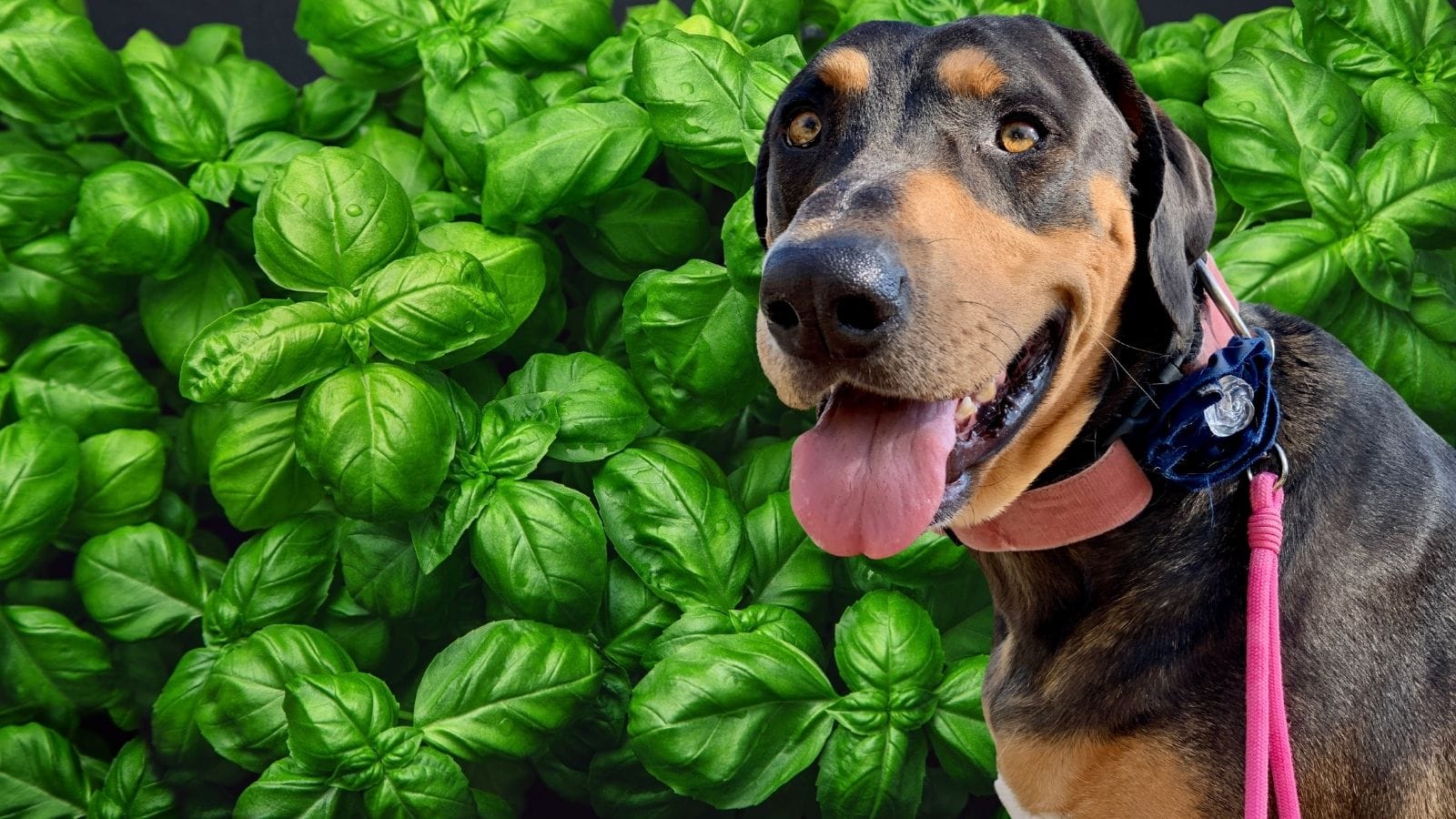Basil is a popular herb in many households, used in various dishes to add flavor and aroma. However, pet owners may wonder if it is safe to feed their furry friends this herb. Dogs are known to have sensitive digestive systems, and certain foods can cause adverse reactions. This article aims to answer the question, "Is basil safe for dogs?"

Basil is generally safe for dogs to consume in small amounts. It contains antioxidants and anti-inflammatory properties that can benefit your dog's health. However, it is essential to note that some dogs may have an allergic reaction to basil, just like humans. Signs of an allergic reaction include itching, hives, swelling, and difficulty breathing. If your dog shows any of these symptoms, stop feeding them basil and consult a veterinarian.
In conclusion, while basil is generally safe for dogs to consume, it is crucial to monitor their reaction and feed it in moderation. Pet owners should also ensure that the basil is free from any harmful additives or pesticides. If you have any concerns about feeding your dog basil or any other food, it is best to consult with a veterinarian.

Is Basil Safe for Dogs?
Basil is a popular herb that is widely used in cooking around the world. It is a good source of nutrients, vitamins, minerals, fiber, and antioxidants. But is basil safe for dogs? In this section, we will explore the benefits and potential risks of feeding basil to your furry friend.
Understanding Basil and Its Nutritional Profile
Basil is a member of the mint family and is known for its sweet and fragrant taste. It is a good source of vitamins A, C, and K, as well as minerals like calcium, iron, and magnesium. Basil also contains antioxidants that can help protect your dog's immune system and prevent cell damage.
Health Benefits of Basil for Dogs
Basil has several health benefits for dogs, including its anti-inflammatory properties that can help reduce joint pain and swelling. It also has antimicrobial and antifungal properties that can help prevent infections and skin problems. Basil can also boost your dog's immune system and promote healthy digestion.
Potential Risks and Side Effects
While basil is generally safe for dogs, feeding too much of it can cause upset stomach, vomiting, and diarrhea. Some dogs may also be allergic to basil, which can cause allergic reactions like itching, swelling, and difficulty breathing. If your dog shows any signs of an allergic reaction, seek professional veterinary help immediately.
Recognizing Allergic Reactions
If you suspect that your dog is allergic to basil, look out for signs like redness, itching, swelling, and hives. In severe cases, allergic reactions can cause anaphylaxis, which is a life-threatening condition that requires immediate medical attention.
Safe Quantities and Serving Suggestions
To avoid potential side effects, it is best to feed basil to your dog in small quantities. A teaspoon of fresh or dried basil sprinkled on your dog's food is a safe amount. You can also make homemade pesto without garlic or onions and serve it as a treat. However, avoid feeding your dog large amounts of basil or basil pesto, as they may contain toxic ingredients.
Toxic Ingredients Often Paired with Basil
Garlic and onions are often paired with basil in recipes, but they are poisonous to dogs and can cause anemia and other serious health problems. If you want to make homemade pesto for your dog, use only dog-friendly ingredients.
Non-Toxic Alternatives and Dog-Friendly Herbs
If your dog is allergic to basil or you want to try other herbs, there are several non-toxic alternatives that you can use. Some dog-friendly herbs include parsley, oregano, thyme, and rosemary. These herbs can also provide various health benefits and nutrition for your furry friend.
In conclusion, basil can be a healthy and tasty addition to your dog's diet when fed in small quantities and without toxic ingredients. However, if you have any concerns or your dog shows any signs of an allergic reaction, seek professional veterinary help immediately.
Incorporating Basil into Your Dog's Diet
Basil is a safe and healthy herb that can be incorporated into your dog's diet. It is a great source of vitamins and minerals and can provide a variety of health benefits for your furry friend. However, it is important to prepare basil in the right way and consult with your veterinarian before making any changes to your dog's diet.
Preparing Basil for Dogs
Fresh basil is the best option for dogs. It is important to wash the basil thoroughly and remove any stems or leaves that are wilted or discolored. Dried basil can also be used, but it should be used sparingly as it is more concentrated than fresh basil.
Roasted basil is not recommended for dogs as it can cause digestive issues and upset stomachs.

Recipes and Ideas for Basil-Based Dog Treats
Basil can be used to make a variety of delicious and healthy snacks for your dog. Here are a few ideas:
- Basil and cheese dog biscuits
- Basil and chicken jerky
- Basil and peanut butter dog treats
When making homemade dog treats, it is important to use dog-friendly ingredients and avoid any harmful additives or preservatives.
Consulting with Your Veterinarian
Before incorporating basil into your dog's diet, it is important to consult with your veterinarian. They can provide you with advice on how much basil to give your dog and whether it is appropriate for their specific needs.
If your dog has any underlying health conditions or is taking medication, it is especially important to speak with your veterinarian before making any changes to their diet.
In conclusion, basil can be a healthy and nutritious addition to your dog's diet when prepared and used correctly. By following these tips and consulting with your veterinarian, you can ensure that your furry friend stays happy and healthy.
Understanding Dogs' Dietary Needs
The Role of Herbs in Canine Nutrition
Herbs have been used for centuries to promote health and wellness in both humans and animals. In dogs, herbs can provide a variety of health benefits, including improved digestion, reduced inflammation, and relief from anxiety and arthritis pain. Some herbs also contain antioxidant properties, which can help protect against cellular damage and illness.
When it comes to adding herbs to a dog's diet, it is important to do so in moderation and under the guidance of a veterinarian. While many herbs are safe for dogs, some can be toxic or cause digestive issues if given in large amounts. It is also important to ensure that any herbs used are of high quality and free from contaminants.
Common Health Issues and Dietary Considerations
Dogs have unique dietary needs that must be taken into consideration when selecting foods and supplements. In addition to providing essential nutrients such as vitamins and minerals, a dog's diet should also contain fiber to support digestive health.
Certain health issues may require additional dietary considerations. For example, dogs with arthritis may benefit from a diet that is high in omega-3 fatty acids, which have anti-inflammatory properties. Dogs with digestive issues may benefit from a diet that is low in fat and easy to digest.
Overall, understanding a dog's dietary needs is essential for promoting optimal health and wellness. By incorporating herbs and other dietary considerations into a dog's diet, pet owners can help support their furry friend's overall health and well-being.
Common Myths about Basil and Dogs
Dispelling misconceptions is crucial when considering basil for your furry friend. Let's unravel some common myths surrounding basil and dogs to ensure you have accurate information.
Myth 1: Basil is Toxic to Dogs
Contrary to this myth, basil is generally non-toxic to dogs. In fact, when introduced in moderation, it can provide nutritional benefits. However, like any new food, observe your dog for adverse reactions.
Myth 2: All Dogs Love Basil
While some dogs may enjoy the taste of basil, it's not a universal truth. Dogs, like humans, have individual preferences. Don't be discouraged if your pup isn't a basil enthusiast – there are various herbs to explore.
Myth 3: Basil Cures All Ailments in Dogs
While basil does offer health benefits, it's not a magical cure-all for every ailment. It's part of a balanced diet that contributes to overall well-being, but veterinary advice is crucial for addressing specific health issues.
Myth 4: Dogs Will Only Benefit from Fresh Basil
While fresh basil is excellent, dogs can also benefit from dried basil. Dried forms retain some nutrients and can be a convenient option, especially if fresh basil is unavailable.

Conclusion
In conclusion, basil can be safe for dogs in moderation. It is important to note that some dogs may have an adverse reaction to basil, so it is always best to introduce it slowly and in small amounts. Additionally, it is important to avoid giving dogs basil that has been seasoned with garlic or onion, as these can be toxic to dogs.
Overall, basil can provide some health benefits for dogs, such as anti-inflammatory properties and improved digestion. However, it should not be relied upon as a sole source of nutrition or treatment for any health conditions.
As with any new food or supplement, it is recommended to consult with a veterinarian before introducing basil to a dog's diet. They can provide guidance on appropriate serving sizes and any potential risks or concerns based on the dog's individual health and medical history.
In summary, basil can be a safe and healthy addition to a dog's diet when given in moderation and with caution.
Frequently Asked Questions

- Q1: Can Dogs Eat Basil?
- Yes, dogs can eat basil. Basil is non-toxic to dogs and can be a healthy addition to their diet. However, it is important to note that basil should not be the main source of nutrition for dogs. It should only be given in moderation as a treat or added to their regular food.
- Q2: What Are the Signs My Dog Is Allergic to Basil?
- Like with any food, dogs can have an allergic reaction to basil. The signs of an allergic reaction can include itching, swelling, hives, vomiting, and diarrhea. If your dog shows any of these symptoms after consuming basil, it is recommended to stop giving them basil and consult with a veterinarian.
- Q3: How Does Basil Affect a Dog's Digestive System?
- Basil can help dogs with digestive issues such as gas and bloating. It contains compounds that can help detoxify the liver and aid in digestion. However, too much basil can also cause digestive upset in dogs. It is important to give basil in moderation and monitor your dog's response to it.
- Q4: Could Basil Help with My Dog's Anxiety?
- Basil has calming properties and can help reduce anxiety in dogs. It contains compounds that can help regulate the nervous system and promote relaxation. However, it is important to note that basil should not be used as the sole treatment for anxiety in dogs. It should be used in conjunction with other treatments and under the guidance of a veterinarian.
- Q5: Is Basil Effective for Preventing Cell Damage in Dogs?
- Basil contains antioxidants that can help prevent cell damage in dogs. Free radicals can cause damage to cells and lead to health issues such as cancer and aging. Antioxidants can neutralize free radicals and protect cells from damage. Adding basil to your dog's diet in moderation can provide them with these beneficial antioxidants.




